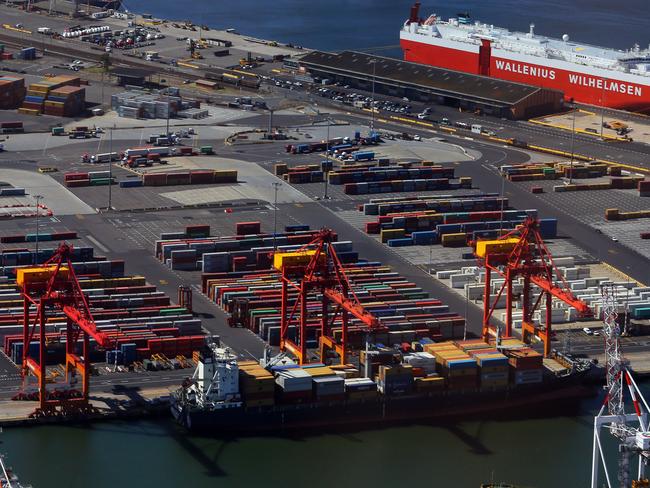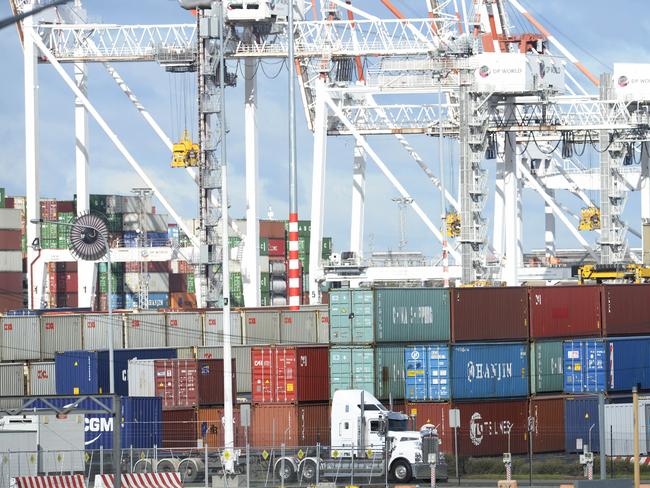Port pain tipped to further fray supply chain
A critical shortage of RATs for port and freight workers could lead to supplies of pharmaceuticals and fuel being left stranded in shipping containers, on Victoria’s docks.
Coronavirus
Don't miss out on the headlines from Coronavirus. Followed categories will be added to My News.
A shortage of Rapid Antigen Tests stranding port and freight workers at home even if they’re not sick is threatening to worsen product shortages.
Industry and logistics chiefs say 20 to 50 per cent of some key workforce groups are now being impacted by Covid-19 — with many deemed close contacts of people infected and requiring tests to check if they are safe to return to work.
Federal and state governments have promised millions of self-administered RATs will be here by the end of the month, but without immediate intervention industry groups say the supply chain could fray further.
Victorian Transport Association chief executive Peter Anderson said free rapid antigen tests must be provided to transport workers.
“Stevedores have been facing the same close contact labour shortage issues as the broader freight sector, where some trucking companies have reported up to 50 per cent of drivers isolating at some point since Christmas,” Mr Anderson said.
“Changes to isolation rules will help to alleviate stevedore labour shortages, but when close contacts can’t work because they don’t have access to the rapid tests they need, what’s the point?”

Supermarket chiefs have already introduced buying limits on some items due to dwindling stock, while fast food chains have warned some goods will be unavailable this month.
Ports Australia chief executive Mike Gallacher said the shipping sector had done an “amazing job” insulating itself from the coronavirus but Omicron meant there were many “people being affected by people being infected”.
Pharmaceuticals, fuel and agriculture supplies are now under growing pressure, amid concerns about delays unloading containers and getting ships in and out of port.
“Without having access to RATs it’s very difficult to provide a safe working environment,” he said.

“The challenge is over the next few weeks. It will go beyond that, but when we see RATs coming in then it will give people confidence.”
One shipping industry source said “the delays we have seen both land side and water side will continue” but it was hoped product shortages would be “no worse than it was at its worst last year” because there were now more vessels servicing Australia.
A spokeswoman for container terminal operator Patrick Terminals said industrial disputes, Covid-positive workers, and the need for other employees to isolate had caused delays.
“Whilst there has been some delays up to a few days, the business continues to operate 24/7 drawing from the broad workforce pool,” she said.
New research from leading data company HERE Technologies also shows congestion worsening on roads surrounding Melbourne’s port by 4.5 per cent late last year.
This contributed to the increased amount of time that container ships were spending at the port, with West Gate Freeway logjams doubling travel times on that road during peak hour in November.
Maritime Union of Australia national secretary Paddy Crumlin said the federal government had “failed” in its coronavirus response and blamed it for the supply chain crisis.
Tim Piper, Victorian director of the Australian Industry Group, said sensible changes had now been made to testing regimes for key sectors, including the waste industry, but a scarcity of RATs was making exemptions fruitless for some workers.
One requirement was that close contacts returning to work take tests every day for five days.
“I am calling on the government to ensure they have got these RATs available because there will be people who want to use those exemptions, but can’t because there aren’t enough tests around,” he said.
Mr Piper pointed to the almond industry as an industry where dozens of staff were forced into isolation if one worker tests positive, due to shared dormitories used.
He also called for the Commonwealth to consider a visa tweak whereby people with visas but no work rights were given “an opportunity to work in the short term”.




